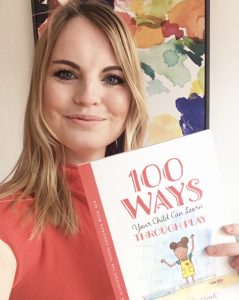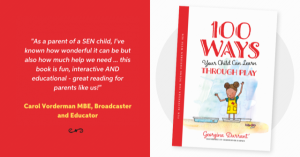 Georgina Durrant is a private tutor for children with special educational needs and the author of ‘100 Ways Your Child Can Learn Through Play’. Here she talks about the importance of play and how families can use it to help children develop new skills.
Georgina Durrant is a private tutor for children with special educational needs and the author of ‘100 Ways Your Child Can Learn Through Play’. Here she talks about the importance of play and how families can use it to help children develop new skills.
“Over the course of the pandemic there’s been a lot of concern over children, in particular those with Special Educational Needs, missing out academically and whilst this may be true, I strongly believe that we need also to focus on the fact that children have also missed out on play. Playing with friends, playing outside, playing with grandparents, playing at their friend’s house…the list goes on. And whilst play might be seen as something trivial it’s actually imperative for children’s well-being and their development of important skills. I’d go as far as saying that for young children, play is learning.
Play is everything, it’s squishing play dough and in turn developing those important fine motor skills that help them learn how to write. It’s walking and balancing on that fallen log in the park and learning how to take risks and finesse their gross motor skills. And it’s falling out with a friend over who has the best sequins for their craft and learning those really important social skills and language/communication skills.
 But what do I mean exactly by play and why is it so important ?
But what do I mean exactly by play and why is it so important ?
There are lots of different types of play, from sensory play to imaginative play and all types of play can benefit children’s development in different ways.
– Sensory play (simply play that involves the senses) such as playing with sand, water etc. can be particularly calming for many children, helping them to relax after a busy day and take time to process situations. It can be fantastic for sensory integration and emotional regulation.
– Risky play (play that involves children taking some level of freedom and risk over their play..within limits) can help children learn important problem-solving skills for later in life, develop resilience. Risky play can also help children practise concentration skills.
– Imaginative play is wonderful for lots of things, particularly language and communication skills and social skills. It can also be brilliant for families and teachers to observe- as often you get an insight into how children are feeling and the things they are worried about by seeing them act them out during play. For example you might see your child setting up a small school with their toys and them acting out that one of the toys doesn’t have anyone to play with at playtime. This could be a reflection of what your child is experiencing themselves (or has seen other children experience) and it can provide a precious opportunity to discuss this situation with your child and develop strategies together of dealing with it.
Children’s appetite for play also has a crucial role in helping them to develop friendships- and friendships are incredibly important for children’s social and emotional well being.
So how can families help their children develop skills through play?
Firstly, often you don’t always need to do very much. It’s really important to provide time for free play where your child can choose what to play with- enabling them to enjoy play and relax. Remembering that free play is important for developing skills as well as helping with mental well-being.
You can also help by encouraging play based activities with your child. These might be sensory play activities, especially after a busy day, to help your child relax and regulate their emotions. Or weaving literacy, numeracy and motor skills into playful activities. For example, if you’re playing ‘vets’ maybe you could help your child to make notes about the patient, draw the sign, count the patients etc.
But the most important thing to remember is play should always be fun! And we mustn’t feel guilty about children ‘just’ playing, instead feel empowered that their play is helping them to develop a whole range of skills that will help them throughout their lives.
 I’m so passionate about the importance of play based activities helping develop skills that during the first lockdown (whilst juggling home schooling!) I wrote a book on the topic: ‘100 Ways Your Child Can Learn Through Play (Fun Activities for Children with SEN)’ (https://amzn.to/3wdYWMu) published by Jessica Kingsley Publishers. Through my book I share a vast range of fun activities that children of all abilities can join in with, to help them develop vital skills (fine motor, gross motor, social skills, working memory, language and communication, literacy/numeracy, concentration, problem solving, emotional regulation and sensory integration) The idea was that it would empower parents to feel less guilty that their child was just playing and instead feel confident that their child is in fact learning a whole range of things through play. I also wanted to help parents who might have been told about a specific area that their child needed extra support with (for example language and communication) but weren’t sure how they could help them at home. The book has a little tick box at the end of each activity highlighting which skills that activity helps develop. So you can flick through and find suitable activities to develop certain skills. As well as just using it as a recipe book for play based activities! ”
I’m so passionate about the importance of play based activities helping develop skills that during the first lockdown (whilst juggling home schooling!) I wrote a book on the topic: ‘100 Ways Your Child Can Learn Through Play (Fun Activities for Children with SEN)’ (https://amzn.to/3wdYWMu) published by Jessica Kingsley Publishers. Through my book I share a vast range of fun activities that children of all abilities can join in with, to help them develop vital skills (fine motor, gross motor, social skills, working memory, language and communication, literacy/numeracy, concentration, problem solving, emotional regulation and sensory integration) The idea was that it would empower parents to feel less guilty that their child was just playing and instead feel confident that their child is in fact learning a whole range of things through play. I also wanted to help parents who might have been told about a specific area that their child needed extra support with (for example language and communication) but weren’t sure how they could help them at home. The book has a little tick box at the end of each activity highlighting which skills that activity helps develop. So you can flick through and find suitable activities to develop certain skills. As well as just using it as a recipe book for play based activities! ”
Georgina Durrant
About Georgina
Georgina Durrant is a former teacher/SENDCO now private tutor (online) for children with Special Educational Needs. She is author of ‘100 Ways Your Child Can Learn Through Play’ (https://amzn.to/3wdYWMu) a book packed full of play based learning activities, published by JKP for parents of children with SEN. It has been endorsed by celebrity SEN parents Carol Vorderman and Rob Delaney! She’s also founder of the SEN Resources Blog (www.senresourcesblog.com) which shares her activity ideas, advice and recommended resources for parents and teachers.
Twitter www.twitter.com/senresourceblog
Facebook www.facebook.com/senresourcesblog
Instagram www.instagram.com/thesenresourcesblog
